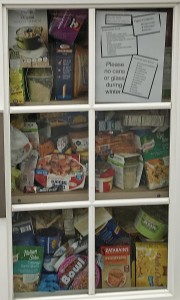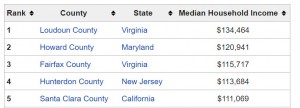If you’re looking to make a difference for the less fortunate this Chanukah and Christmas Season, to help the homeless find shelter and the hungry to find food to eat, think about “Mobile Hope” in Leesburg as some Lovettsville folk are doing.
If you need some advice on what to give in the way of food, there’s a “window” into what works best in the winter, on the side of the Lovettsville Historical Society.
You may have had a visit at your home recently from the Lovettsville Scouts or a troop from your neighborhood, going around collecting food you can spare for the hungry.
You may have visited the homeless and helped to feed them.
A parent explained how and why he took his son to a homeless shelter; he said, his boy had no real understanding that there were those close by who were hungry and didn’t have a place to stay.
Some say they can only imagine what it would have been like this past weekend to have to sleep outside with temperatures dropping to 26 degrees Fahrenheit.
Others ask how could there be homeless and hungry in Loudoun County and the surrounding region?
This question is a little like the young boy who discovered that not everybody got to live as he did.
Loudoun is considered in some median income listings the wealthiest county in the United States; the American Community Survey (ACS), conducted by the US Census Bureau, concluded that Loudoun had the highest median household income in the nation.
Yet, Loudoun has hungry and homeless.
Some live in the woods, quite exposed, and can be seen in the morning collecting themselves, with a backpack, or with black garbage bags, containing their few possessions, perhaps stuffed in a shopping cart, as they set out to look for food and shelter that day.
One person who collected food and clothing for a shelter found he couldn’t leave the food or clothing because the shelter was closed, not just to receive these well-meaning offerings, but closed to the homeless as well.
This past May, the Metropolitan Washington Council of Government issued its 18th annual report on homelessness in the region.
Loudoun did worse this year.
There were more homeless persons, 134 of them, a 19% increase over last year’s total; the majority of single homeless persons are white; a number of them are veterans; many have some income but not enough to live on; there is an increase in single adult households, and an increase of the fragile homeless, those over 65, and those with chronic health conditions or disabilities.
The COG report says, at p. 92, for the period, November to March, “[d]ue to facility constraints there is currently no Cold Weather Shelter available for families needing to access this service.”
The Report does suggest “partners” will pick up the slack but there wasn’t any finding about how effective this alternative would be.
On the night the count was taken in Loudoun by the “unsheltered outreach teams” they found makeshift shelters, exposed to the elements, with little to shield the homeless from the cold.
Of course, it’s not that nothing is being done.
But the numbers tell us that more needs to be done.
Some asked why heated government buildings are not available on the coldest of days for the homeless.
As for private charity, a fair seasonal thought experiment today is how many people would open their door after dark to a young pregnant woman and her husband, and give them shelter and sustenance for the night?
One neighbor told me that he has all this room in his house. He said he feels badly about the homeless and would have them in his home. He said he doesn’t require much privacy any more. He just feels badly that he has space that could shelter others.
More frequently stated was the question, why can’t our unused public buildings at night open their warm halls to the homeless, and lessen the risk of suffering and harm for the homeless?




